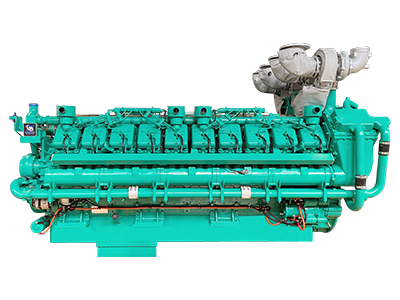Diesel Engine
Generator Set
Electronic fuel injection diesel engines have high fuel control accuracy and injection response speed.Continuous working condition load output can be achieved in industrial applications.Its structural features determine that it has the ability to operate under load for a long time.The key lies in system matching,heat dissipation design,oil circuit stability and lubrication maintenance strategies.
The electronic fuel injection system uses an electronic control unit(ECU)to manage the fuel injection time and quantity.The engine can adjust the injection curve according to the load changes.It can reduce the accumulation of carbon deposits and improve combustion efficiency.It is more suitable and has a longer output than traditional mechanical diesel engines.
The cooling system is the core guarantee.Adopt forced water cooling or oil cooling schemes,combined with large-displacement water pumps and thermostat control modules.Ensure that the temperature of the cylinder wall is controlled within a reasonable range.The design of the radiator needs to take into account factors such as the heat exchange area,circulation flow rate,and purity of the coolant.Ensure that the operating temperature rise does not exceed the limit.
The lubrication system supports the pressure distribution on the friction surfaces of key components.The crankshaft,connecting rod,camshaft and other parts need to maintain a stable oil film.Select high-temperature and high-shear stability engine oil.Oil pressure and oil temperature should be incorporated into the monitoring logic.Avoid the risk of wear or seizing caused by lubrication attenuation due to long-term high load.

The stable supply pressure of the fuel system.High-pressure common rail systems are widely used in electronic fuel injection diesel engines.The injection pressure curve is maintained through the coordinated operation of a high-pressure oil pump and multiple solenoid valves.Under continuous operation conditions,the fuel filter should have sufficient filtration capacity.Prevent nozzle blockage or rail pressure fluctuations caused by particulate impurities.
The electronic control system is equipped with overload,overheat and overspeed protection logic.Some models are equipped with CAN bus or remote monitoring interface.It is convenient for real-time collection of equipment status.Support early warning mechanisms to prevent continuous damage caused by single-point failures.
The material selection and structural strength of the engine body are the prerequisites.Solutions such as cast iron cylinder blocks,alloy cylinder heads,and reinforced connecting rods can enhance the thermal load carrying capacity.The intake and exhaust systems are well-matched,which can prevent excessive back pressure from causing temperature accumulation.
The actual working conditions should take into account factors such as external environmental temperature,altitude,and intake air cleanliness.In high-altitude,high-humidity and high-temperature scenarios,additional power reduction or voltage limiting operation strategies need to be evaluated.The maintenance cycle should be adjusted according to the operating hours.Regular replacement of engine oil,coolant and filters is a fundamental measure to ensure full-load reliability.
The electronic fuel injection diesel engine has the ability to operate at full load for a long time within the design parameter range.The prerequisite is that the operating conditions,maintenance measures and system parameters match.Reasonable selection and standardized operation are the keys to ensuring stable output.